#曹丕
Explore tagged Tumblr posts
Text






真・三國無双8
曹丕 2023 まとめ3
9 notes
·
View notes
Text
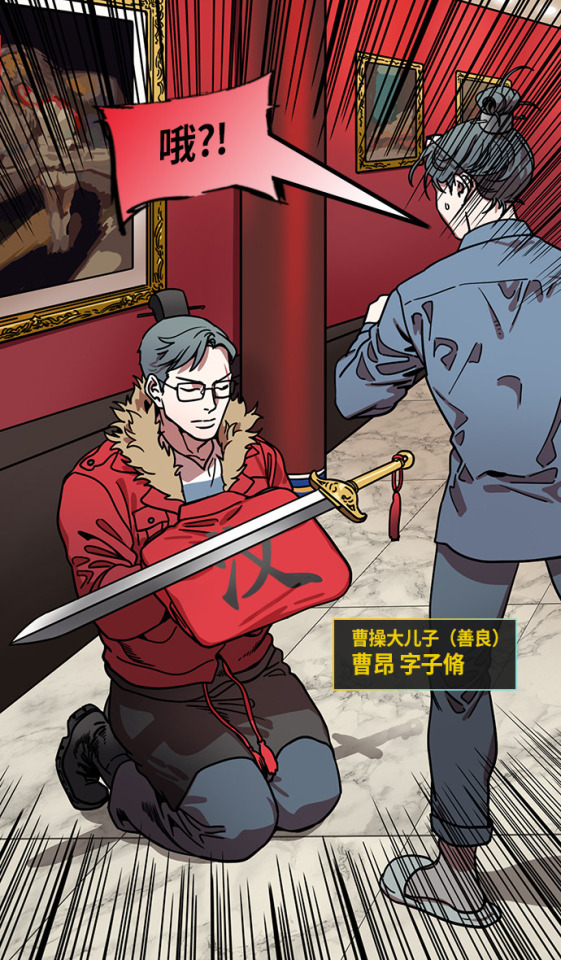
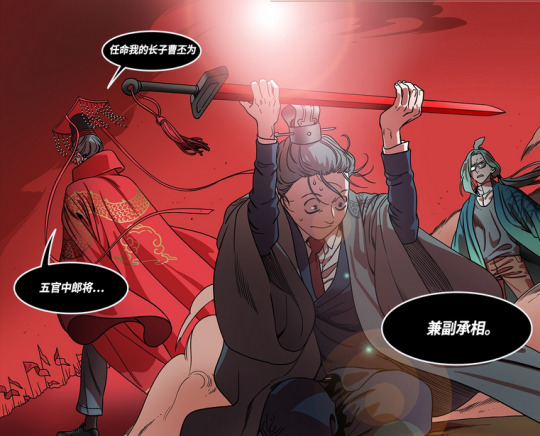
A son who offers a sword, a son who receives a sword. And ofc, Saturn Devouring His Son as the backdrop for Cao Ang, I swear I'll never get over this
16 notes
·
View notes
Photo
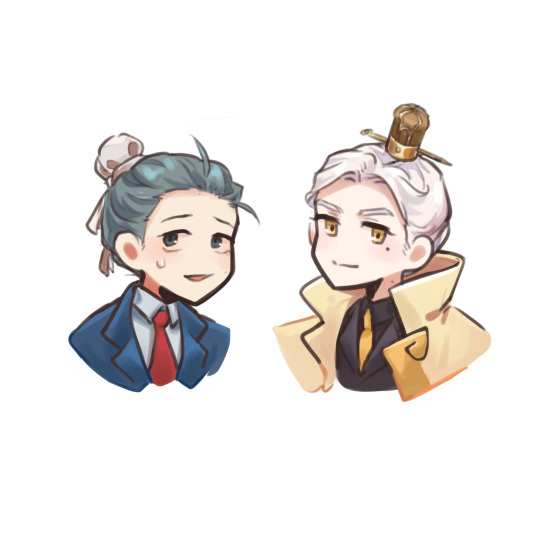
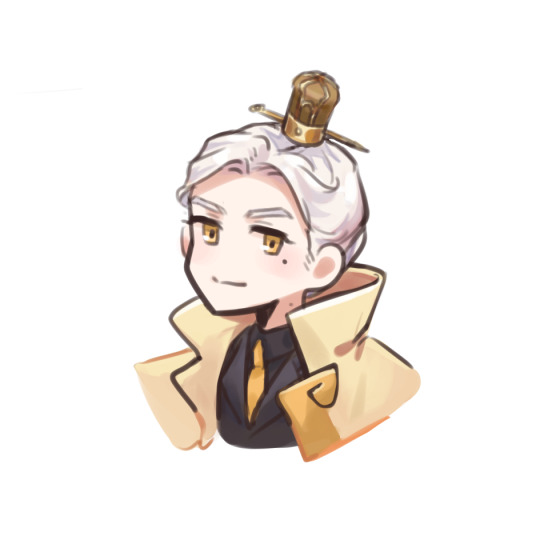

之前開的點圖! Q版塗鴉~曹丕、袁紹
0 notes
Text

真・三國無双8 - 曹丕
三國志真戦コラボ先の曹丕さんの立ち絵かっこよい…………かわいい………最高………ありがとう………!
7 notes
·
View notes
Text
忘川风华录 Cheat Sheet - THREE KINGDOMS
Character list for the music project/game Wang Chuan Feng Hua Lu
Cheat sheet created solely for my own convenience
All images etc taken from the game's official website
Info taken from Wikipedia
Mao-mao not included, sowwy
曹植 | Cao Zhi | Tào Thực

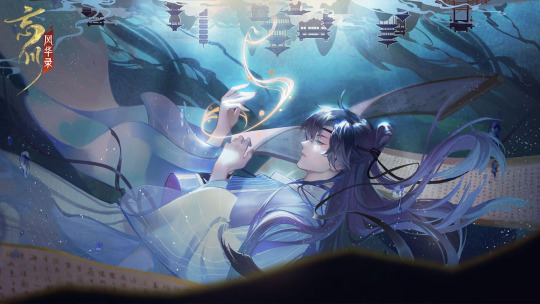
192 – 232
Poet, son of the warlord Cao Cao, author of Luo Shen Fu
Extremely unfavoured by his family
Song: Duo Qing An
Also appears in: Kuang Gu Hui Xiang
In-game rarity: 天
赵云 | Zhao Yun | Triệu Vân

Died 229
Military general, subordinate of Liu Bei and his state Shu Han
Song: N/A
Also appears in: Kuang Gu Hui Xiang
In-game rarity: 天
曹丕 | Cao Pi | Tào Phi

187 – 226
Older brother of Cao Zhi, son of Cao Cao, first monarch of Cao Wei after the state's foundation was laid out by his father
Song: N/A
Also appears in: Kuang Gu Hui Xiang
In-game rarity: 地
甄姬 | Zhen Ji | Chân Cơ
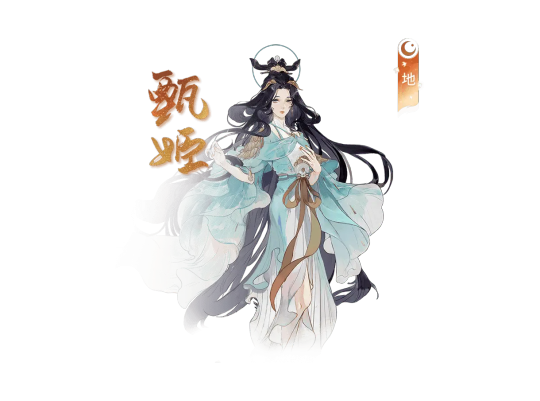

183 - 221
First wife of Cao Pi, post-humously honoured as first empress of Cao Wei
Song: Duo Qing An
Also appears in: Ci Qi Ying Qi, Kuang Gu Hui Xiang
In-game rarity: 地
嵇康 | Ji Kang | Kê Khang

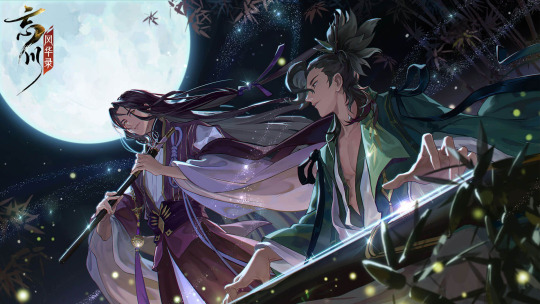
223 – 262
Poet, musician, composer of Guang Ling San
One of the Seven Sages of the Bamboo Grove
Song: Zhu Lin Jian
Also appears in: Kuang Gu Hui Xiang
In-game rarity: 地
阮籍 | Ruan Ji | Nguyễn Tịch


210 – 263
Poet, musician, composer of Jiukuang, friend of Ji Kang
One of the Seven Sages of the Bamboo Grove
Song: Zhu Lin Jian
Also appears in: Kuang Gu Hui Xiang
In-game rarity: 地
2 notes
·
View notes
Text
Previously, when Cao Cao attacked and massacred the city of Ye, many women from the Yuan family were seized and assaulted. Cao Cao's son, Pi, privately took Yuan Xi's wife, Lady Zhen. Kong Rong then wrote a letter to Cao Cao, invoking the saying, "King Wu of Zhou conquered King Zhou of Shang and bestowed Daji upon Duke Zhou." Cao Cao could not understand, and later asked which classic this quote came from. Kong Rong replied, "Judging from the affairs today, I believe it certainly happened." -- Book of the Later Han, Biography of Kong Rong 初,曹操攻屠鄴城,袁氏婦子多見侵略,而操子丕私納袁熙妻甄氏。融乃與操書,稱「武王伐紂,以妲己賜周公」。操不悟,後問出何經典。對曰:「以今度之,想當然耳。」
-- 《後漢書 · 孔融傳》
11 notes
·
View notes
Quote
曹丕の時代に入ると関内侯に封じられ侍中に昇進した。 蜀将の孟達が降伏してきた際、曹丕はこれを厚遇したが、劉曄は孟達の忠義心の薄さを指摘してこれを諌めている。 曹丕は聞き入れなかったが、後に劉曄の予想通り孟達は裏切った。 関羽の敗死後、曹丕は群臣に劉備が呉に報復をするかどうか下問した事があった。 世論は「蜀は小国で、名将と言えば関羽のみ。その関羽と多くの兵が失われた今、蜀に戦う力は無い」として、これを否定していた。しかし劉曄のみは「蜀が小国であるからこそ、劉備は国内に武勇を示さねばならず、親子の同然の関係である関羽を殺されて復讐しないのでは、その誓いを全う出来ない」と述べ、必ず報復をおこなうと見ていた。 果たして劉備は呉に攻め込み、呉は魏に対して臣従を誓う使者を派遣した。 群臣はこれを祝賀したが、劉曄は「呉は外圧を受けて切羽詰って使者を派遣してきただけで、とても信用できるものではありません。呉の困窮に乗じてこれを討つべきであり、この機を���せば数代に渡る患いを残す事になります」と進言したが、劉曄の言葉通り呉は劉備を退けた後、魏に叛いた。
劉曄 - Wikipedia
2 notes
·
View notes
Text
大軍師司馬懿之軍師聯盟 二十三話

明明如月,何时可掇? 忧从中来,不可断绝。 越陌度阡,枉用相存。 契阔谈讌,心念旧恩。
現代語訳:
月は明るく輝くが、 いつそれを手に取ることができるだろう。 憂いは心の中から起こる 断絶することはできない そんな中君たちは道を越え道を渡り わざわざ私を訪ねてきてくれたので、 久しぶりに会って、語らい酒を酌み交わし、 心に昔のよしみを思おう
最近見てるドラマです。司馬懿、司馬仲達(そう、孔明に走らされたあの仲達です...)を主人公とした三国志ドラマです。
曹操の最後、意外と感動しました。長年争いを続け天下統一を願ったあげく、知り合いは一人ずつ死んでいき、自分も年の流れに逆らうことができない。天下はまだ収めていない、国はまだ不安定である。だがすべては次世代に託すしかない。そういった心を込めた最後でした。
そして!やっと曹丕と司馬懿が表にでる時が来ました!次は弟達が企んでいる中、無事魏王にならなければ...
3 notes
·
View notes
Text
司馬仲達が頭を下げた男![常林の実像]
司馬仲達が頭を下げた男![常林の実像] #司馬仲達 #常林 #三国志 #はじめての三国志
司馬仲達(しばちゅたつ)。曹操の晩年に仕え曹丕の側近として活躍していきます。仲達は曹叡(そうえい)の時代になると蜀の諸葛孔明の北伐迎撃軍の総司令官として任命され、魏国の軍事面のトップとして頭角を現すことになります。 その後、曹爽(そうそう)との政争に勝利を収めると司馬家の権力の基礎を作ることになるの人物です。そんな彼ですが、頭を下げて接していた人物がいたのをご存知でしょうか。今回は仲達が頭を下げて礼を尽くした人物についてご紹介したいと思います。 貧乏だけど学問好きであった 司馬仲達が後年頭を下げて礼を尽くして接した人物の名を常林(じょうりん)と言います。彼は若い頃家が貧乏でしたが、しっかりと働いて生活し他人からの施しを受けない人物であったそうです。そんな彼の唯一好きなことでやめられなかった事は学問です。 彼は貧乏でしたが、一生懸命学問に励み…
0 notes
Text

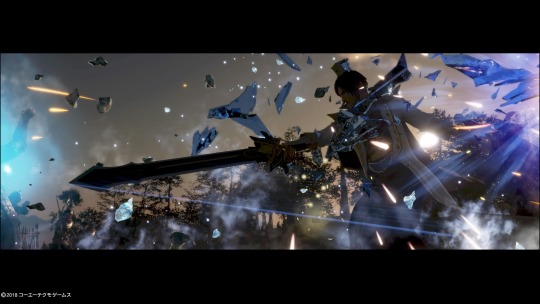
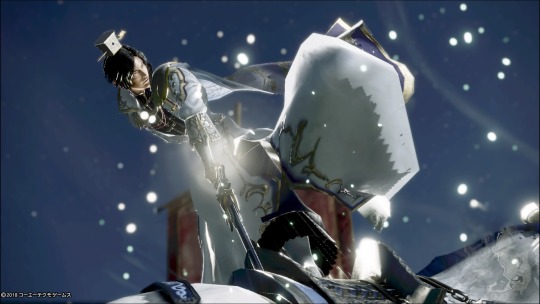
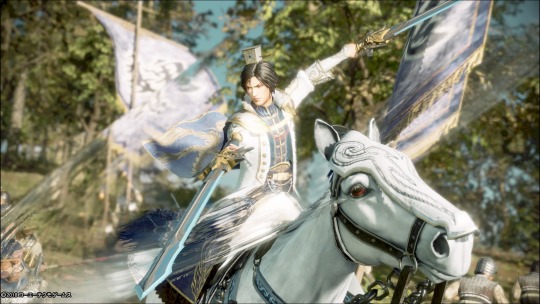

真・三國無双8
曹丕 2023 まとめ2
7 notes
·
View notes
Text
《魏略》:干一名良。良本陈妾子,良生而陈氏死,太祖令王夫人养之。良年五岁而太祖疾困,遗令语太子曰:“此儿三岁亡母,五岁失父,以累汝也。”太子由是亲待,隆于诸弟。良年小,常呼文帝为阿翁,帝谓良曰:“我,汝兄耳。”文帝又愍其如是,每为流涕。
Translation:
[Cao] Gan was also called Liang. Liang was originally the son of Concubine Chen, [but] she died after he was born, Taizu (Cao Cao) ordered Lady Wang to raise him. When Liang was five years old Taizu became deathly ill, and on his deathbed said to the Crown Prince (Cao Pi): This boy lost his mother at three, and his father (Cao Cao) at five, I'll have to trouble you to take care of him." The Crown Prince took care of him personally, favoring him over his other younger brothers. When Liang was young, he often called Wendi (Cao Pi) Grandpa, the Emperor would say to him, "I'm your brother" and weep in pity.
Cao Pi raising Cao Gan...sobbing. Samtalk actually did cover this with that livestream scene where Cao Gan called Cao Cao grandpa instead of dad.
9 notes
·
View notes
Text
Willow Song (Yangliu ge 楊柳歌)
The willow tree by the river had boughs of a hundred feet,
its long branches hanging curling to the ground.
The currents rushing and dashing, the roots of the willow in danger,
suddenly it was blown by wind and waves into the river.
How pitiful—the young phoenix in the nest on the willow tree!
Somehow, back then, it was severed from its home.
Once the drifting raft went off, it rose to the Pool of Stars,
and should be taking away the loom-stone of the Weaver.
[Legend has it that as the Han envoy Zhang Qian 張騫 was looking for the source of the Yellow River, his raft arrived at the Heavenly River, and he obtained the stone used by the Weaving Girl, the goddess of weaving to support her loom]
Who would believe that all it needed to shelter several states was only one little southeastern branch?
[In a fragment from Sun Chuo 孙綽's Sunzi 孙子, a man of the mountain tells a man of the sea that a huge tree of the Deng Grove may shelter several states. This couplet refers to the former might of the willow tree and suggests the past power and glory of the Liang.]
The young lord who in the old days made outings at Nanpi,
where can one find him now on the banks of Xuanwu Pond?
A handsome charger galloping toward the northwest,
to left and right the rider arched his bow, shooting at the Yuezhi.
[In these lines Yu Xin alludes to a number of writings by the Cao princes: in one of his letters, Cao Pi 曹丕 (187-226) recalled their outings at Nanpi in the old days; Cao Pi's poem "Written at the Xuanwu Pond" ("Yu Xuanwu pi zuo" 於玄武陂作) begins with the line: "Brothers go on an outing together." Cao Zhi 曹植(192-232)'s "Ballad on the White Horse"("Baima Pian" 白马篇) describes the military accomplishments of a chivalrous knight-errant.]
The mudguard patterned with stringed coins got soiled in crossing the brook,
[It was said that the minister Wang Ji 王济's horse had to cross a stream but feared staining the precious mudguard it was wearing.]
and the white jade tablet fell into the mouth of the coiled dragon.
[Emperor Ming of the Jin (r. 322–24), while still a little boy and the crown prince, put his white jade tablet in the open mouth of a bronze coiled dragon; the jade tablet slipped in and could not be recovered. It is likely that the jade tablet powerfully epitomizes the tragic fate of Xiao Gang 萧綱, one of the Liang princes and the poet's "understanding friend"]
New pipes of the phoenix, Xiao Shi had played them;
through the spring window of vermilion bird,
the Jade Maiden was peeping.
[Xiao Shi was the son-in-law of the Duke Mu of Qin. Playing on his panpipes, he summoned a phoenix and rode away with his wife. In Han Wudi gushi 漢武帝故事, Dongfang Shuo 東方朔 was said to have peeped at the Queen Mother of the West through the vermilion bird window.]
The wine goblet containing clouds was made of red agate;
the food vessel of purple glass reflected the sun.
If you think that a man has no ambition,
let me ask you—how did Mount Yan acquire its stone stele?
[The Eastern Han general Dou Xian 窦憲 inscribed his grand victory over the Xiongnu army on a stone stele on the Mount Yanran 燕然]
And yet, what has lasted a hundred years of frost and dew all at once withers,
suddenly one morning, accomplishments and fame are out of reach.
It must be that King Huai had erred in his plan,
recanting for no reason and trusting Zhang Yi.
[King Huai of Chu was duped by the Qin minister Zhang Yi and severed relations with the state of Qi. King Huai later died in Qin.]
Ah, one had better get drunk at the Gaoyang Pond,
coming back at day's end, wearing one's cap upside down.
[Toward the end of the Western Jin, the state was beset with troubles, but Shan Jian 山簡, the governor of Xiangyang, cared only about drinking. He often drank by a scenic local pond, which he referred to as his "Gaoyang Pond," Gaoyang being a reference to the Western Han figure Li Yiji 酈食其, the self-styled "Drunkard of Gaoyang." A song was made about Shan Jian coming home drunk and wearing his cap upside down.]
Who had transplanted the willow from the Wuchang city gate?
[The Eastern Jin general Tao Kan once recognized a willow transplanted from the west city gate of Wuchang.]
How could one still recognize it in front of the Guandu encampment?
[Cao Pi, in the preface to his "Fu on the Willow" ("Liu fu"柳賦), relates that he had planted a willow at Guandu in 200; now, fifteen years later, the tree had grown a great deal, and "many of my followers had died."]
I alone still remember the days when its catkins were blown around like goose feathers;
today, there are no more silk threads hanging like the green horse-binders.
I would like to leave a song about the willow, a companion piece for "Plum Blossoms,"
[Both "Breaking the Willow Branches"(“Zhe Yangliu” 楊杨柳) and "Plum Blossoms Fall"("Meihua luo" 梅花落) were popular yuefu titles in the Southern Dynasties.]
so as to play the tunes together on a long flute.
Yu Xin(513-581), Chinese poet of the Northern and Southern Dynasties. A friend of the Southern Liang court, he was detained on a mission to the Northern dynasties(Western Wei and Northern Zhou), witnessing the fall of Liang in 557 and never again returned to the South.
Tian, Xiaofei. (2008). Parting Ways: Writing Trauma and Diaspora in the Poetry of Mid-Sixth Century China. In Hsiang Lectures on Chinese Poetry, Vol. 4 (pp47-82). Centre for East Asian Research, McGill University.
#Chinese literature#Chinese poetry#Chinese poem#ancient China#Chinese history#Asian history#Yu Xin#Tian Xiaofei#I mean Yu lived in the only period of aristocracy in Chinese history#and it has echoes
0 notes
Text
鼎鼎大名的三國,三國人物能活過六十都不容易。
2024年9月13日 【極速三國:一秒開戰】

https://youtu.be/yVPOzhjNtH8
這電動遊戲 蠻有意思的。。。
曹操(155年—220年3月15日)65
曹魏奠基者。子曹丕建立曹魏,追尊廟號為太祖,追諡武皇帝。
曹丕(187年—226年6月29日)40
公元220年使東漢漢獻帝禪讓於丕。登基稱帝後改國號為魏,史稱曹魏,226年駕崩,諡文皇帝。
孫權(182年7月5日—252年5月21日)吳大帝。70
劉備(161年—223年6月10日)三國時代蜀漢開國皇帝,在位三年。諡號昭烈皇帝。 62
關羽(160年(?)年—220年1月)60上下
張飛((?)—221年)
諸葛亮(181年—234年)54
周瑜(175年—210年)35
呂蒙(178年—220年)42
司馬懿(179年—251年9月7日)72
0 notes



